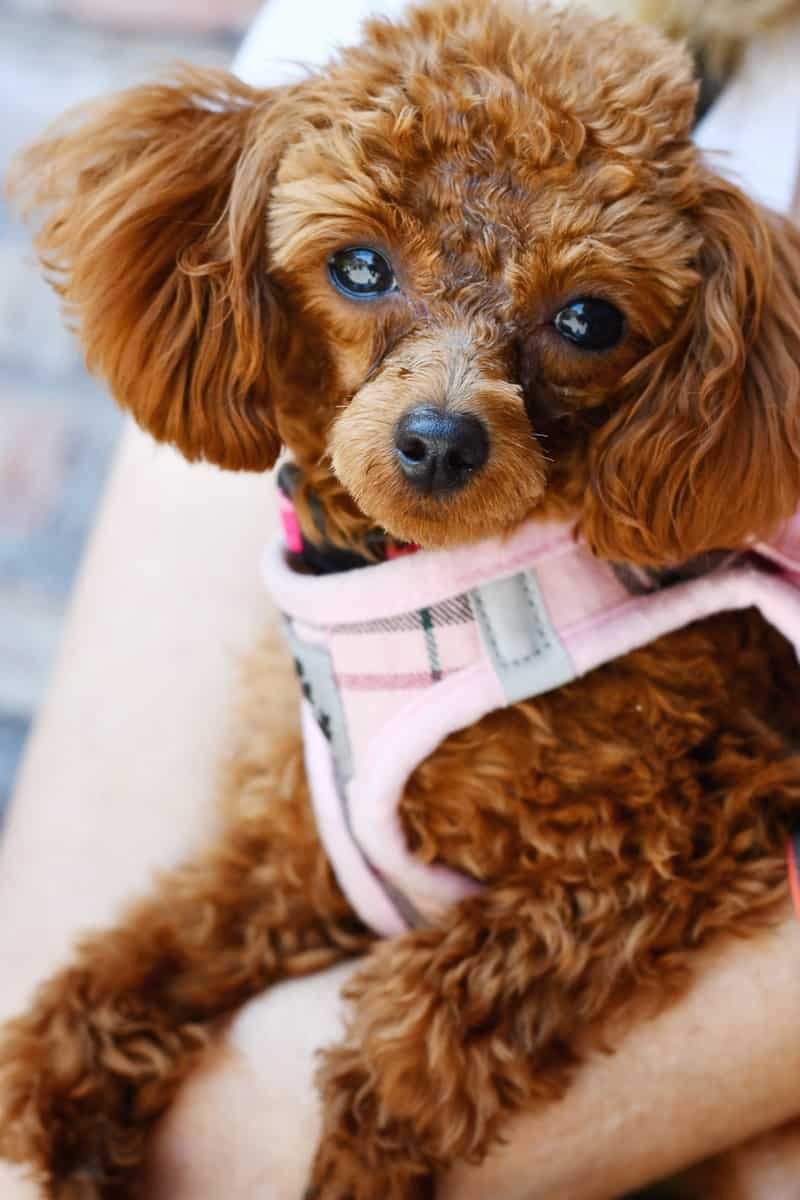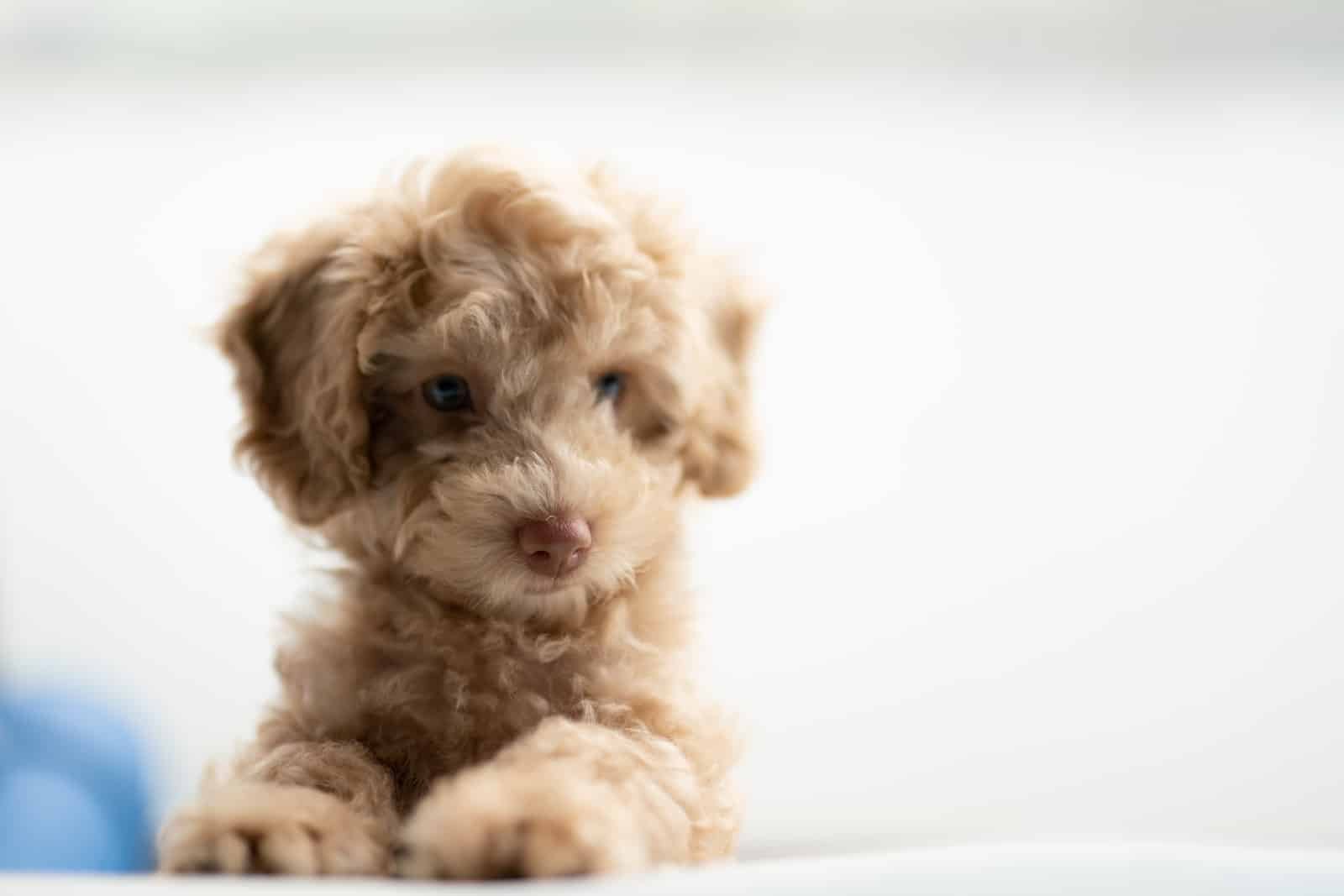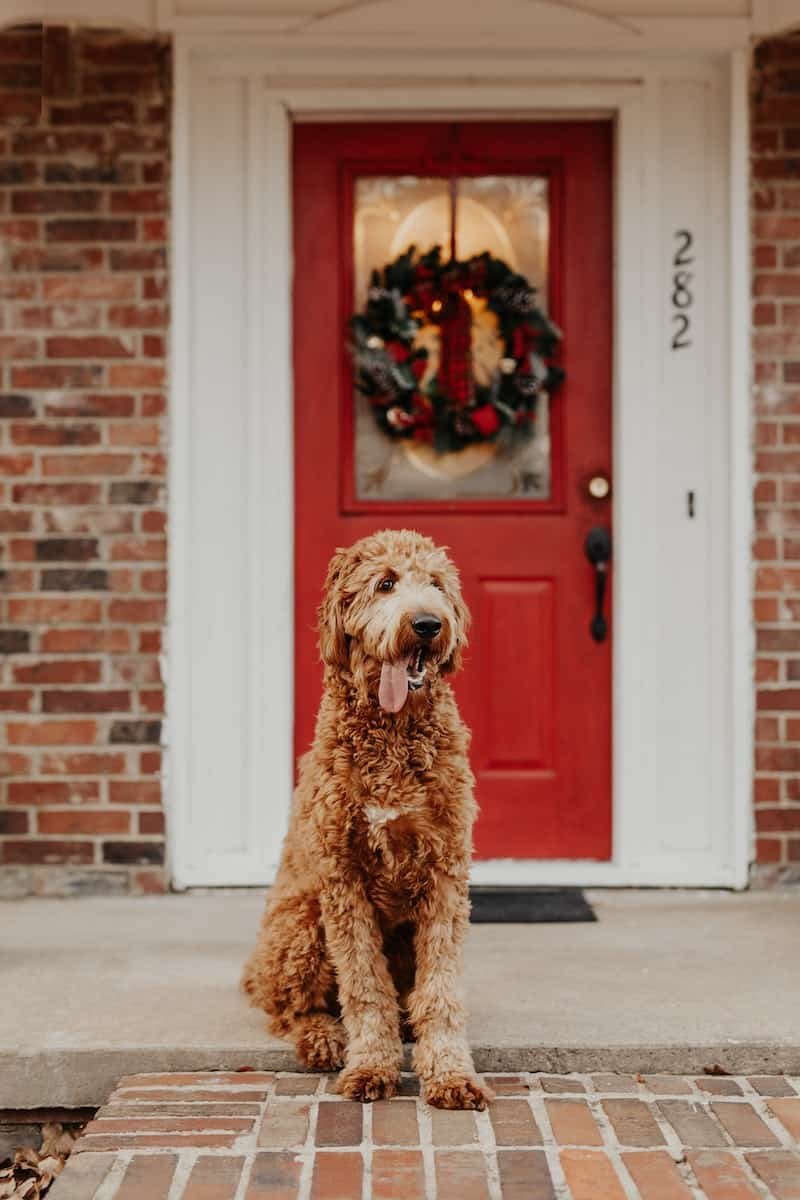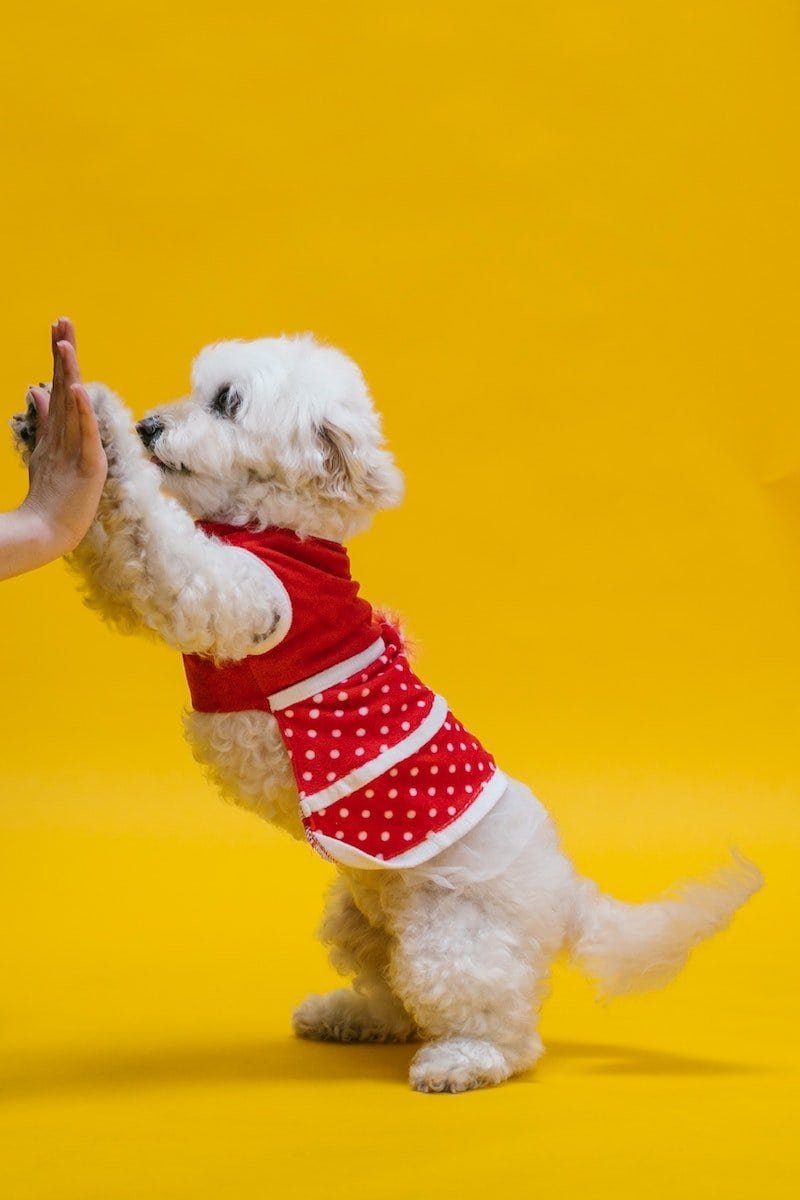
Toy Poodles are a popular companion dog breed because of their small size and intelligent nature. But even with their small size, they aren’t a dainty breed!
Before you get a Toy Poodle, you need to learn more about what they are like to see if they are a suitable pet for you.
Toy Poodle History
Poodles originated from Germany, derived from pudel, meaning ‘to splash in the water.’
This dog breed was meant to be a water dog, with hunters using Poodles to retrieve waterfowls. They then made their way to France, quickly growing in popularity. But over time, more people began wishing for a smaller and more manageable sized pet than the Standard Poodle.
Real breeders then started breeding the runts of the Poodle litters, and that’s when the Miniature Poodle came along. They bred a smaller version to sniff out truffles.
People wished for an even smaller Poodle, though! Following the similar pattern before, breeders in the 18th century started breeding the smallest Miniature Poodles, which resulted in the Toy Poodle.
Toy Poodles weren’t for specific jobs or services. They are companions of dog lovers who wished for affectionate, intelligent lapdogs.
The Toy, Miniature, and Standard Poodles are the same breeds, and their main difference is that they come in different sizes.
Toy Poodle Appearance
Toy Poodles are the smallest of three main classes of Poodle, as classified by the American Kennel Club. Toy Poodles grow up to 9 inches tall, weighing between 6-10 pounds.
They look just like your regular Poodle but smaller. Toy breeds can have a wavy or curly coat of hair, feeling either soft or wiry. They also come in various solid colors, from apricot and cream to red or silver. Sometimes they have a two-tone coat combination!
The Poodle’s gorgeous coat is of great interest to many, as they only have a single layer of hair instead of fur. Because of this, it tends to shed far less than other dog breeds, making it hypoallergenic. However, they still shed but have less dander present, resulting in less risk for people with allergies and/or experiencing allergic reactions.
That is why those with allergies choose to get Poodles, as they don’t suffer from allergies as much.
Are Toy Poodles Good Family Pets?
To answer this question, I’ll delve into their personality and what to expect of them.
Similar to the different types of Poodles, Toy Poodles are very intelligent, making them easy to train. Poodles are eager to please and adore attention, so they learn commands reasonably quickly. But be careful, as their cleverness can lead to stubborn and destructive behavior if you don’t train them well.
Toy Poodles are also very friendly and sociable, happy to make new friends with other people and animals. They make great dogs for families and those with pets, though you have to take caution. Children are curious and sometimes play rough, like other pets. Given the size of your Toy Poodle, they may end up getting hurt if things go too far!
Given their size and the typical Poodle stereotype, one might presume that Toy Poodles are high maintenance and fussy. But that’s not the case! They are very active and good-tempered.
As long as you give your Toy Poodle an adequate amount of exercise, he will enjoy his time cuddling on your lap indoors. Think of him as your best friend that wants to be with you 24/7 quietly!
While that makes Toy Poodles the optimum companion, it also means that they don’t like being left out from family activities. Like other Poodles, they are more prone to separation anxiety. When left alone for long periods, they will become anxious, nervous, and frustrated. It results in excessive barking and destructive behavior!
If you are a lovable family with older children or adults, the Toy Poodle will make a great family pet. But if you have younger children and toddlers around, it’s best to get a Miniature or Standard Poodle. They are bigger and can take on the activity levels that children and other pets have.
Training and Exercise Needs
While the Toy Poodles are small, they still need daily activity. What makes them different is the amount and intensity of exercise required.
I recommend taking them on daily walks, playing fetch, and even going to the pool, as they naturally love the water! If you can’t go out, then fun indoor games and toys are good exercises.
Besides physical exercise, make sure that you give your Poodle enough mental stimulation. You can provide this through games, puzzle toys, and daily training sessions. That way, your dog’s mind stays occupied, and his spirits are happy.
Your Toy Poodle needs to be crate trained, housetrained, and undergo obedience training in terms of training. It’s best to begin training as soon as possible to establish proper manners and prevent them from picking up bad habits.
Both daily exercise and training can help strengthen your bond with your dog as well! As long as you stay consistent and use positive reinforcement every time you train your dog, he will enjoy your time together and learn quickly.
Since they are an intelligent breed, consistent training will be a cakewalk as long as you do it correctly. Over time, you can teach your dog more complex commands and tricks to impress others.
Furthermore, Toy Poodles shouldn’t skip socialization. They need to be exposed to other people and animals early on, or they become aggressive or shy when meeting someone new.
Socialization builds confidence, and it can be introduced by taking them to doggie daycare, the dog park, or allowing people and other pets to visit. Make sure to be slow and steady during this process so you don’t scare your dog!
Health and Care
On average, Poodles can leave between 12-14 years. Toy Poodles have lived for over 14 years on average, which makes sense since smaller dogs live longer than larger ones. Toy Poodles are more likely to live a long, fulfilling life as healthy adult dogs by taking care of them well.
That said, it doesn’t mean Toy Poodles are free from any health risks. Here are some of the common medical conditions and genetic diseases they are prone to having in the long term:
- Progressive Retinal Atrophy – Progressive Retinal Atrophy (PRA) is a genetic eye disorder that affects Toy Poodle puppies and other breeds of dogs. It occurs when the retina, which is responsible for transmitting visual signals to the brain, degenerates over time. This can lead to blindness if not diagnosed and treated early. Most cases of PRA in Toy Poodles are caused by a mutation in the gene RPE65.
- Cataracts – Cataracts can occur in any breed of dog, but Toy Poodle puppies are particularly prone to them. Cataracts are cloudy patches that form over the eye’s lens, blocking light from passing through and impairing vision. As a result, an affected puppy may experience difficulty seeing objects up close or far away. In most cases, cataracts develop slowly over time , so it’s important to keep an eye on your pup’s vision and schedule regular veterinary check-ups if you notice any changes.
- Patella Luxation (knee joint malformation) – Patella Luxation is one of the most common health problems in Toy Poodle puppies. It is a malformation of the knee joint that affects many small breeds, such as toy poodles. In this condition, the kneecap (patella) slides out of its normal position and slides back into place during movement. This can cause pain, lameness, and even arthritis if left untreated. Therefore, it’s important to have your puppy checked by a veterinarian regularly for any signs of patellar luxation. Surgery is the most common treatment, and it can help in alleviating pain and restoring normal movement in the affected joint.
- Von Willebrand’s Disease (genetic blood disorder) – Von Willebrand’s Disease (vWD) is a genetic blood disorder that affects Toy Poodle puppies and other breeds including Doberman Pinschers, German Shepherds, Golden Retrievers, and Cocker Spaniels.
This disorder causes a decrease in the production of von Willebrand Factor (vWF), a protein which helps the platelets in the bloodstream to form clots. This can cause excessive bleeding if the dog is injured or undergoes surgery. Therefore, it’s important to have your puppy tested for vWD before adoption and to keep them on a regular health protocol afterwards. - Thyroid Problems – Thyroid problems are another common medical condition in Toy Poodle puppies. The thyroid gland produces hormones that regulate metabolism, energy levels, and certain other bodily functions. If this gland is not functioning properly, it can affect the puppy’s growth and development. Sometimes, thyroid problems can be managed with medication, but in some cases, surgery may be necessary.
- Hip Joint Issues and Orthopedic Disorders – Toy Poodles can be vulnerable to hip joint issues and orthopedic disorders due to their small size. It’s important to discuss these concerns with a vet prior to adoption, as many of these conditions can be managed with proper care and preventive measures.
Hip dysplasia is the most common hip joint issue that Toy Poodles can face. This condition is caused by an abnormal formation of the hip joint, which can lead to pain and lameness. In addition, Toy Poodle puppies may be prone to developing. - Eye Problems – Toy Poodles are prone to eye problems, including entropion (eyelids that roll inward) and distichiasis (extra eyelashes). These conditions can cause discomfort for the dog and may require medical treatment. It’s important to keep a close watch over your pup’s eyes in order to catch any potential issues early on.
- Elbow Dysplasia – Elbow dysplasia is a common health issue in Toy Poodle puppies and adult dogs. It is a group of developmental disorders affecting the elbow joint in dogs and is caused by an abnormal growth pattern of the elbow joint.
Symptoms may include lameness, pain, inflammation, and/or arthritis-like changes in the affected joint(s). While this condition is hereditary, it can also be These are just some of the health issues that Toy Poodle puppies may face. It’s important to research the breed and discuss any potential concerns with a vet prior to adoption.
With proper care and preventive measures, these conditions can be managed successfully. If you have any questions about adopting and/or caring for your Toy Poodle puppy or caring for one, reach out to your local animal shelter or rescue group for advice. - Blood clotting disorders – Cushings Disease: Cushing’s DiseaseCushing’s Disease is a hormone disorder that is caused by an overproduction of cortisol from the adrenal gland, which can lead to a range of symptoms, such as increased thirst and urination, hair loss, skin infections, and more.
Because of this, it’s essential to have your Toy Poodle puppy screened (such as conducting a genetic analysis) and vaccinated. Doing so will help prepare you for any risks of certain health conditions and to prevent them from happening.
Just because a Toy Poodle is less likely to shed than other dogs doesn’t mean you shouldn’t groom him regularly. They need more brushing to prevent tangles and mats. The hair they shed will end up stuck in their coat, leading to matting if left unattended.
It’s best to brush your Toy Poodle’s coat at least thrice a week, or even daily, if possible. During their brushing session, inspect their ears and give them a trim and proper cleaning to prevent ear infections.
As for grooming, take them to a professional groomer or do it yourself every 4-6 weeks. The grooming procedure should include a good bath with brushing and trimming of coat and nails afterward.
When trimming your dog’s gorgeous coat, you can ask a professional groomer to give your dog a specific style. There are many Poodle haircuts you can choose from, and here are the more popular ones:
- Continental clip
- Modified Continental clip
- English Saddle cut
- Puppy cut
- Teddy bear cut
- Lion cut
You will also want to protect their teeth, either brushing their teeth or using enzyme toothpaste daily. Toy Poodles are a small breed prone to dental diseases, so you have to maintain their dental health!
Who are Toy Poodles Best For?
Toy Poodles make fantastic pets for those who lead an active lifestyle but want a lapdog who will stay by their side with loyalty and affection. They are small enough to easily carry around anywhere you go, making them the ultimate companion at home, running errands outdoors, or even traveling!
But if you are always outside the house and don’t have time for exercise and playtime, nor can you commit to regular grooming needs, then the Poodle may not be for you.
Admittedly, Toy Poodles do have a few disadvantages to watch out for. It’s best to know the good AND the bad, so you know what to expect of your next pet. These are the pros and cons of Toy Poodles to see if they are a good fit for your lifestyle:
Pros:
- They are smaller than other Poodles, so they take up less room. That means they are great for those living in smaller apartments and houses.
- Their small size means less hassle in grooming and less chance of having hair all over the house.
- They are intelligent and easy to train.
- They are very social dogs that want to spend time with their lovable family and other pets.
Cons:
- While they don’t shed often and are considered hypoallergenic, they have high-maintenance grooming needs.
- Toy Poodles need a lot of time and attention, or they suffer from separation anxiety.
- If they are left alone for too long without exercise or mental stimulation, they end up with destructive animal behavior.
- Their small size increases the risk of accidents and injuries when playing with smaller children and animals.
Where to Get a Toy Poodle
Are you interested in getting a Toy Poodle? There are two ways to find one.
You can consider rescue dogs. You probably won’t find a puppy, but Toy Poodles end up in animal shelters or foster homes. You can check with your local animal shelter or search online to help you find Poodles up for adoption.
Owners may surrender their Toy Poodles due to an incompatibility in the household, behavioral issues, or sudden lifestyle changes. Other dogs may have been rescued from abusive homes or suffered from loss. Adoption and rescue can give these dogs a chance at a better life, young or old.
But if you would want a Toy Poodle puppy, you can always find a reputable breeder in your local area. The American Kennel Club and Poodle Club of America will likely have a directory of ethical breeders that offer Toy Poodles for sale.
It’s best to begin your search through your National Kennel Club. Doing so narrows down your options to a responsible breeder who cares for his dogs. Furthermore, they’ll have all the necessary paperwork needed as you purchase and register your new dog.
One thing to consider and prepare for when getting a Toy Poodle is its price. Poodle puppies can cost a few hundred to thousands of dollars. The price increases based on factors like coat color, parents, health checks, genetic tests, and veterinary care during pregnancy. Toy Poodles are also a bit more expensive because of the extensive process and the higher cost of breeding to ensure healthy puppies.
On average, Toy Poodle puppies can cost greater than $1,500. You may find cheaper Toy Poodles online or from other breeders, but beware. Poor breeding practices may compromise the health of the Toy Poodle puppy or parent at one point. It’s best to stick with a reputable breeder and to prepare for the upfront cost, along with the payments and expenses to expect over your new dog’s lifetime.
Remember, owning a Toy Poodle or any other pet is a lifetime commitment! It will be worth all of what you spend to have a happy and healthy companion you’ll love for years.







